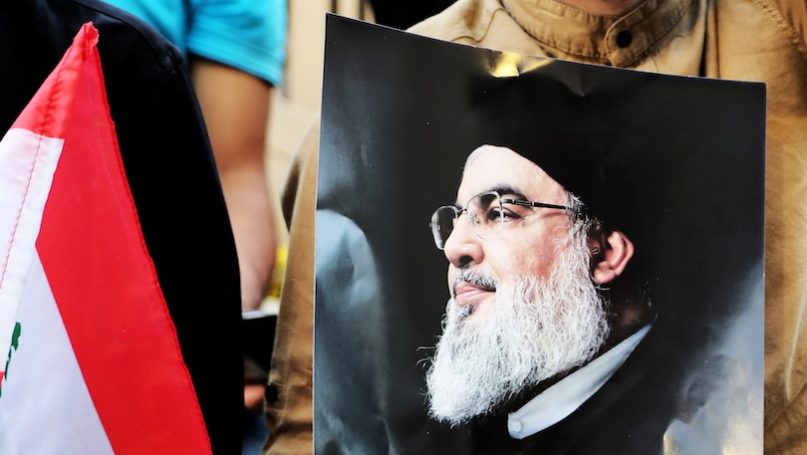
Opinion – Israel’s Two Front War
On Saturday 28 September Israel confirmed that it had bombed the central headquarters of Hezbollah in Beirut and has claimed that the attack killed Hezbollah’s leader, Hassan Nasrallah. Ever since the Palestinian Liberation Organisation (PLO) led by Yassir Arafat had to withdraw from its erstwhile headquarters in Beirut in the 1980s, coupled with the Israeli occupation of southern Lebanon, Hezbollah has been a formidable foe for Israel. On September 16, the Israeli security cabinet approved the return of its northern population. Yet, for Israel, the real threat is the deteriorating security condition in the region with various militant groups operating under the Iranian umbrella. Of these threats, most prominent is the Iranian-backed militant group Hezbollah. Although Iran presides over these groups, there has not yet been a credible response from Tehran after its unsuccessful attempt at bombing Israel in April 2024 via ballistic missiles and drone strikes. This is all the more surprising when considering the international humiliation it faced after the assassination of Ismail Haniyeh on Iranian soil.
The Hezbollah leadership has seemed to not want to escalate this cross-border aerial bombardment into a full-blown war with Israel and at the same time, it cannot cease to obey the demands of the “Axis of Resistance” for that would isolate the group significantly reducing its support and training from Iran. Thus, Hezbollah’s bombing of Israel would not terminate until there is a ceasefire agreement in Gaza. The goals set out by the Axis of Resistance are three-fold: to prevent Israel from launching a ground offensive against Hezbollah, to dislodge the US from its presence in Syria and in the long-term, to draw up a plan to fight Israel in a protracted regional conflict.
After October 7, the raid by Hamas sparked off this regional conflagration, around 60,000 civilians had to be evacuated from northern Israel. Israel has vowed to eradicate the Hezbollah threat in its northern border in order to relocate the evacuated population to those areas and restore normalcy. Benny Gantz, former Israeli Defence Minister has echoed the same position as the Netanyahu government which is to end hostilities from Hezbollah. Moreover, Netanyahu is under pressure from its far-right partners in the government to not opt for a ceasefire with Hezbollah. The Netanyahu government and its far-right coalition partners have refused both the US, France, and Arab states to approve a ceasefire for a 21-day hiatus in an effort to kick-start negotiations for a permanent ceasefire. Also, a joint statement by twelve countries was rejected by the Netanyahu government.
Israel’s endgame in Lebanon is to restore a sense of strategic deterrence against Hezbollah and other militant outfits in the region. However, this deterrence would come at a humongous cost for Hezbollah and the Lebanese people, notably subsequent to the military response in the Gaza strip. Besides, given the nature of Hezbollah’s sophisticated militia force this war could become a long-drawn conflict similar to Gaza. Apart from cross-border clashes, Hezbollah’s attacks which include mortars, rockets, missiles, and drones have accelerated in 2024 with the purpose of stalling Israel’s move to secure its northern border. In a tit-for-tat battle in late July, Israel accused Hezbollah of killing twelve children in a missile raid and in response eliminated Fuad Shukr, a founding member of Hezbollah’s armed wing in Beirut that killed three children and wounded many more as collateral damage.
The IDF had put out an animation exposing missiles, rockets, and military hardware that Hezbollah has covertly stashed in civilian houses. Intermittent flare ups and secondary explosions have occurred in some houses that were shown in a footage released by Israel with rockets (mis)firing after the airstrikes hitting the targets. As the air campaign has picked up speed and virulence, Prime Minister Benjamin Netanyahu has promised to keep the airstrikes limited to Hezbollah in order to destroy their capabilities. Still, the death of civilians due to large-scale explosions is adding to the humanitarian catastrophe. What is noteworthy is that the death toll has already crossed 670 in Lebanon, which is more than the number of civilian losses in 2006.
There have been casualties on both sides, approximately 50 soldiers and civilians have died in Israel and around 1500 in Lebanon as a consequence of cross-border exchanges. As far as Washington’s commitment over this brewing conflict is concerned, some claim the US is preparing to bolster the approximately 40,000 troops it has in the Middle East alongside warships and four squadrons of fighter aircrafts. The US Department of Defense (DOD), Secretary of Defense Lloyd J. Austin has reiterated support for Israel and its right to defend itself. However, in reality, the primary thrust of US foreign policy seems to push for diplomatic solutions rather than escalate the conflict into a broader regional war (which seems unlikely). At the moment, Israel seems to be betting on Washington’s absence from any proactive diplomatic settlement in the raging conflict as US elections loom.
There are three scenarios that could dictate the outcome of this ongoing conflict. First, given the trajectory of the past year of war between Israel and Hamas, with no definite interventions from the West and specifically the Arab states, it is unlikely that a broader regional war will break out. Most Arab countries have expressed outrage for Israeli actions in Gaza and Lebanon and continue to rally for a two-state solution with Palestinian sovereignty at the helm. But they are also cautious of pushing for a course of action that would give Iran more leverage. A ground offensive would lead Israel into a quagmire, especially considering past and recent failures to capitulate Hamas (2023) or Hezbollah (2006); the latter has more resilience unlike Hamas and terrain depth in terms of sloped valleys which would provide an edge for asymmetric warfare. Moreover, Hezbollah is heavily armed, and is alleged to possess more than 150,000 rockets and missiles with the ability to hit every part of Israel. Finally, it has more than 100,000 fighters who are battle hardened from the Syrian war.
Second, Israel’s resolve to destroy the Shi’ite militia is unshakeable as much as its perseverance to resettle its large population to its northern border. This is not the first time that southern Lebanon has come under a barrage of Israeli shelling of this magnitude; in 2006, a similar bombing campaign was unleashed on different parts of the country although the concentration was southern Lebanon. This military campaign was in retaliation to an air attack decoy planned and perpetrated by Hezbollah on northern Israel and later, it was found that the aerial strikes were a diversion for a ground invasion into Israeli territory that ambushed the IDF. The short war of 2006 was an embarrassment for the IDF since the war lasted for 34 days, ending in a stalemate with the withdrawal of the IDF. And most importantly, Hezbollah survived. Lastly, air campaigns by Israel have not worked effectively in the past as Hezbollah’s weapons arsenal is largely underground.
Thirdly, and finally, the increased pressure and scrutiny from the international community might create some clamour in some circles against Israel but any major breakthroughs in halting the war may not materialise. Which is to say, Israel has (so far) held a de facto immunity to carry out whatever it deems fit to do against Hezbollah. Despite the military leverage Israel has, there are some limits to its military prowess. For example, it may prove counterproductive for Tel Aviv from achieving its desired ends on the Gaza front, as that would reduce its options to bargain in a diplomatic setback. If a ground invasion occurs, the people of Lebanon would be victims to another humanitarian tragedy caused by Israeli actions. There are also constituencies of resistance against Israel, for instance, at the 79th United Nations General Assembly (UNGA), the Turkish Prime Minister Recep Tayyip Erdoğan called out the UN’s inaction and lambasted Benjamin Netanyahu for his murder network.
In the coming days and weeks, these scenarios, and perhaps others, may play out.
Further Reading on E-International Relations
About The Author(s)
Bishwajit Acharya is a PhD candidate and ICSSR Doctoral Fellow at the Centre for Russian and Central Asian Studies, School of International Studies, Jawaharlal Nehru University. His doctoral thesis focuses on the intrinsic relationship between identity and security within the framework of securitisation theory with respect to Russia.
Soumya Narain is pursuing her PhD as a Senior Research Fellow at Jawaharlal Nehru University (JNU), New Delhi. Her doctoral thesis entails studying the complex relationship between identity and geopolitics in Russia and Ukraine.
Before you download your free e-book, please consider donating to support open access publishing.
E-IR is an independent non-profit publisher run by an all volunteer team. Your donations allow us to invest in new open access titles and pay our bandwidth bills to ensure we keep our existing titles free to view. Any amount, in any currency, is appreciated. Many thanks!
Donations are voluntary and not required to download the e-book - your link to download is below.

 Movie
Movie 3 months ago
112
3 months ago
112 





![Presidents Day Weekend Car Sales [2021 Edition] Presidents Day Weekend Car Sales [2021 Edition]](https://www.findthebestcarprice.com/wp-content/uploads/Presidents-Day-Weekend-car-sales.jpg)



 English (United States)
English (United States)